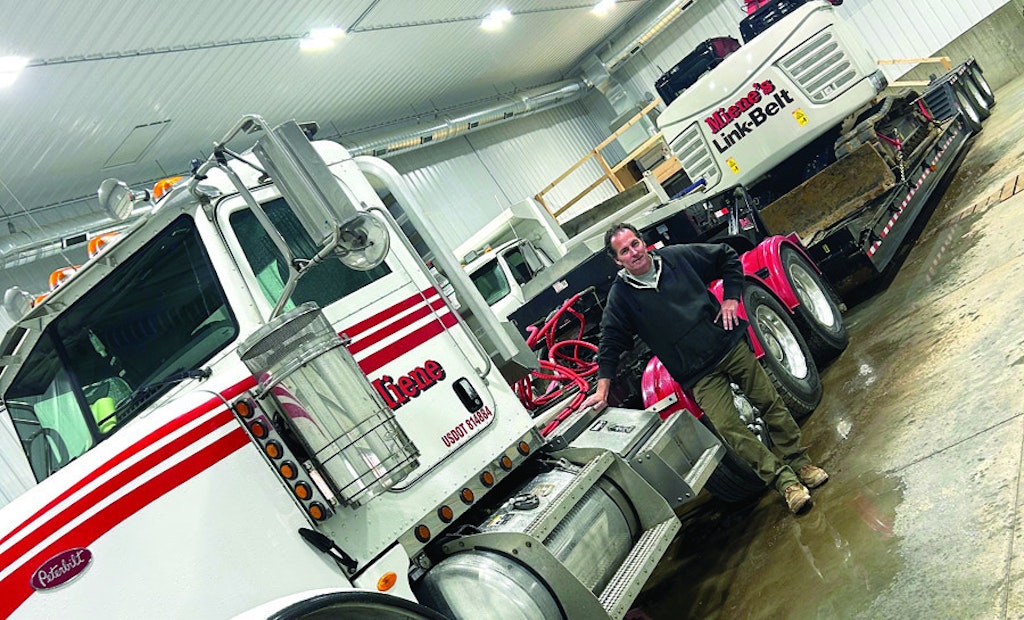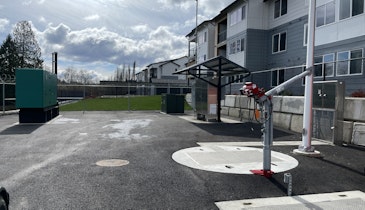
Rick Miene is shown with his 2011 Peterbilt and Link-Belt 145 excavator. (Photo courtesy of Rick Miene)
Interested in Business?
Get Business articles, news and videos right in your inbox! Sign up now.
Business + Get AlertsIn Snapshot, we talk to a member of a state, provincial or national trade association in the decentralized wastewater industry. This time we visit a member of the Iowa Onsite Waste Water Association.
Owner: Rick Miene
Business: Miene Septic Service, Robins, Iowa
Age: 51
Services we offer: Septic system installation, maintenance and pumping; land clearing, grading and excavating. Septic is our backbone but we also have little niches that others don’t do. We’re like a one-stop shop about anything that comes to dirt work.
Years in the industry: We just celebrated our 50th anniversary. My dad started the company, then I took over. So I’ve been in it my whole life. There are pictures of me on job sites with my Tonka Toys. But I received my first official paycheck in 1986.
Association involvement: We’ve been members of the Iowa Onsite Waste Water Association (IOWWA) since 1999 when it started. I have been on the board of directors for eight years and have served as president.
Benefits of belonging to the association: We formed the association because we saw the importance of getting educated, meeting other people, seeing that they were struggling with the same things you were. We can bounce ideas off others who aren’t in our neighborhood. We can collaborate and have a sense of community. We can network with instructors and other professionals, like precasters and suppliers. Having that network of individuals to reach out to is so important.
Biggest issue facing your association right now: We’re trying to find ways to educate people without them feeling like they’re not learning anything because they’ve heard it before. We’re looking for new ideas and hitting on topics people are not talking about and doing a variety of things to keep people engaged. And we want to get people talking about problems because the association is there to help them. We’ve had some challenges working with the Iowa Department of Natural Resources (DNR) and their rule interpretations and I think the association is doing a good job in getting the government to listen to us, and keeping them from getting too powerful.
Our crew includes: My mother, Faith, has been here a long time and does so much — estimating, planning, scheduling, coordinating jobs with homeowners, doing the profit and loss work, answering phones. My son Cameron worked during the summers when he was in school but has since moved on to do his own thing. My daughter Marissa is our “go-fer” person running errands and cleaning equipment, and is working towards getting her CDL. Then we have Jordan Boley, excavation equipment operator, and 2023 WWETT Show national backhoe ROE-D-HOE champion; Kyle Nickvinda, alternative systems, pumping, soil analysis and time of transfer inspections; Chris Usher, pumping and time of transfer inspections; Kurt Vandersee, certified installer; Bob Ford, grading, tree mulching, certified installer and problem-solver on difficult sites; Kolby Morris, dump truck driver and do-everything guy wherever needed; Zach Knoll, dirt work for dozer and excavator; Chris Bodicker, paperwork for time of transfers, permits and locates.
Typical day on the job: I start at 6 a.m. on the phone, checking weather, planning what needs to go where. I might be working on scheduling, directing guys, checking on job sites, meeting clients and contractors. My good days are when I can go get in a piece of equipment and just enjoy myself. The day can end anywhere from 5 to 9 p.m. — but the phone is always on.
The job I’ll never forget: Tight, difficult sites with a lot of topography are always challenging. In one case we had a narrow area between the road and a creek. Somehow we had to fit in the house, the driveway, get 100 feet away from the well, and still get a septic system on it without falling into the creek. There was a 27-foot drop from the front of the house to the back. It was a crazy build and we had to really think outside the box.
My favorite piece of equipment: I like the skid loaders (Bobcat), the dozer (John Deere), and our mini-excavators (Link-Belt 145, John Deere 245, three Bobcats). It’s nice to get big equipment but I enjoy the smaller ones. It’s amazing what you can do with those in tight areas.
Most challenging site I’ve worked on: Our challenging sites are the ones where there’s an enormous amount of paperwork and contracts. For example, we worked at a nuclear power plant and that is just a whole different world. We joked that it was “nuclear time” because it would take forever to do anything. If you had an eight-day work schedule, you were going to get about two hours worth of work done after all the safety meetings and laying things out. So many things were over-thought. It was problematic for getting things done in a timely manner. You learn to appreciate working for residentials.
Oops, I wish I could take this one back: The “oops” is when you get in a hurry. I remember once backing into the shop when I was in a hurry. I backed right smack dab into a new truck and just smashed the whole front end. You need to take the time to check out your surroundings before you cause thousands of dollars of damage.
The craziest question I’ve been asked by a customer: Sometimes people say things like, “I’ve always heard that I don’t have to pump my septic tank. My grandparents and my dad never had to.” But after you get done talking to them you find out it was a straight pipe to the ditch. We tell them, “Your septic system is not your grandparents’ septic system. You need to take care of it like you do your car.” Part of our job is educating people, so we spend a lot of time telling customers what they should and should not be doing.
If I could change one industry regulation, it would be: We’re currently having an interpretation dispute with the DNR about what we feel should be done with treated effluent. There’s been a rule change that we cannot put that water back into the soil. The change I’d like to see is that they get educated and listen to people who are in the know so we don’t have open water becoming stagnant. Iowa is working on that and we’re trying to get some extra backing from NOWRA (National Onsite Wastewater Recycling Association). I fully believe that I am a professional in this industry and I feel very passionate about clean water and being able to utilize our resources the best we can, whether it’s water or wastewater. There are so many ways we can do that. Dumping septage to a wastewater treatment plant is not always the best way.
Best piece of small business advice I’ve heard: This may be self-discovered, but I believe that in a small business you need four key things: a creative accountant, a wise attorney, a good banker and a good insurance agent.
If I wasn’t working in the wastewater industry, I would: I like helping people, solving problems, coming up with ideas on these jobs. So I’d probably look at consulting in the wastewater industry and find ways to join the regulatory and private people who are trying to make businesses work to solve homeowner issues.
Crystal ball time – This is my outlook for the wastewater industry: I see a change coming. As you get out to the east and west coasts where it’s very populated with tight lots, a lot of the denitrification and phosphorus removal technologies, as well as carbon footprints, are starting to become something. I think we’ll see more stringent regulations. People aren’t really set up for that in Iowa because we have room. But even in Cedar Rapids, we do have a lot of these cookie-cutter lots that we are having to get very creative putting septic systems in. I think we have to start paying attention to those regulations and the confinements of what we have. It almost seems like we, as contractors, might have to start getting science degrees. Even farmers are getting into the science of a lot of this with nitrates, nitrogen, ammonia and what you need to do to create sustainable soils without affecting the water table.





